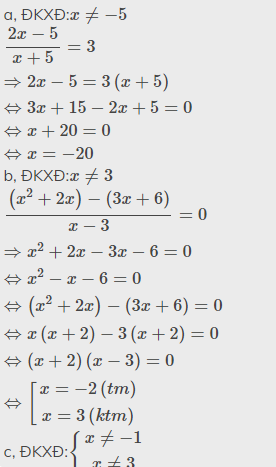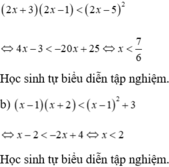giải phương trình sau:(2x-1)^2+5=(2x+3).(2x-3)-x

Những câu hỏi liên quan
3.15 giải các phương trình sau :
a) ( x - 6 ) ( 2x - 5 ) ( 3x + 9 ) = 0
b) 2x( x - 3 ) + 5( x - 3 ) = 0
c) ( x^2 - 4 ) - ( x - 2 ) ( 3 - 2x ) =0
3.16 tìm m để phương trình sau có nghiệm :
x=-7 ( 2m - 5 )x - 2m^2 + 8
3.17 giải các phương trình sau :
a) ( 2x - 1 )^2 - ( 2x + 1 ) = 0
\(a,\left(x-6\right)\left(2x-5\right)\left(3x+9\right)=0\Leftrightarrow\left[{}\begin{matrix}x-6=0\Leftrightarrow x=6\\2x-5=0\Leftrightarrow x=\dfrac{5}{2}\\3x+9=0\Leftrightarrow x=-3\end{matrix}\right.\)
\(b,2x\left(x-3\right)+5\left(x-3\right)=0\Leftrightarrow\left(2x+5\right)\left(x-3\right)=0\Leftrightarrow\left[{}\begin{matrix}x-3=0\Leftrightarrow x=3\\2x+5=0\Leftrightarrow x=-\dfrac{5}{2}\end{matrix}\right.\)
\(c,x^2-4-\left(x-2\right)\left(3-2x\right)=0\Leftrightarrow\left(x-2\right)\left(x+2\right)-\left(x-2\right)\left(3-2x\right)=0\Leftrightarrow\left(x-2\right)\left(x+2-3+2x\right)=0\Leftrightarrow\left[{}\begin{matrix}x=2\\x=\dfrac{1}{3}\end{matrix}\right.\)
\(x=-7\left(2m-5\right)x-2m^2+8\Leftrightarrow x+7\left(2m-5\right)=8-2m^2\Leftrightarrow x\left(14m-34\right)=8-2m^2\)
\(ycđb\Leftrightarrow14m-34\ne0\Leftrightarrow m\ne\dfrac{34}{14}\)\(\Rightarrow x=\dfrac{8-2m^2}{14m-34}\)
\(3.17\Leftrightarrow4x^2-4x+1-2x-1=0\Leftrightarrow4x^2-6x=0\Leftrightarrow x\left(4x-6\right)=0\Leftrightarrow\left[{}\begin{matrix}x=0\\x=\dfrac{3}{2}\end{matrix}\right.\)
Đúng 2
Bình luận (0)
3.15:
a, \(\Leftrightarrow\left\{{}\begin{matrix}x-6=0\\2x-5=0\\3x+9=0\end{matrix}\right.\Leftrightarrow\left\{{}\begin{matrix}x=6\\x=\dfrac{5}{2}\\x=-\dfrac{9}{3}=-3\end{matrix}\right.\)
b, \(\Leftrightarrow\left(x-3\right)\left(2x+5\right)=0\)
\(\Leftrightarrow\left\{{}\begin{matrix}x-3=0\\2x+5=0\end{matrix}\right.\Leftrightarrow\left\{{}\begin{matrix}x=3\\x=-\dfrac{5}{2}\end{matrix}\right.\)
c, \(\Leftrightarrow\left(x-2\right)\left(x+2\right)-\left(x-2\right)\left(3-2x\right)=0\)
\(\Leftrightarrow\left(x-2\right)\left(x+2-3+2x\right)=0\)
\(\Leftrightarrow\left\{{}\begin{matrix}x-2=0\\3x-1=0\end{matrix}\right.\Leftrightarrow\left\{{}\begin{matrix}x=2\\x=\dfrac{1}{3}\end{matrix}\right.\)
3.16
\(\Leftrightarrow\left(2m-5\right).-7-2m^2+8=0\)
\(\Leftrightarrow-14m+35-2m^2+8=0\)
\(\Leftrightarrow-14m-2m^2+43=0\)
\(\Leftrightarrow-2\left(7m+m^2\right)=-43\)
\(\Leftrightarrow m\left(7-m\right)=\dfrac{43}{2}\)
\(\Leftrightarrow\dfrac{m\left(7-m\right)}{1}-\dfrac{43}{2}=0\)
\(\Leftrightarrow\dfrac{14m-2m^2}{2}-\dfrac{43}{2}=0\)
pt vô nghiệm
Đúng 1
Bình luận (0)
1) Giải các phương trình sau : a) x-3/x=2-x-3/x+3 b) 3x^2-2x-16=0 2) Giải bất phương trình sau: 4x-3/4>3x-5/3-2x-7/12
\(a,\dfrac{x-3}{x}=\dfrac{x-3}{x+3}\)\(\left(đk:x\ne0,-3\right)\)
\(\Leftrightarrow\dfrac{x-3}{x}-\dfrac{x-3}{x+3}=0\)
\(\Leftrightarrow\dfrac{\left(x-3\right)\left(x+3\right)-x\left(x-3\right)}{x\left(x+3\right)}=0\)
\(\Leftrightarrow x^2-9-x^2+3x=0\)
\(\Leftrightarrow3x-9=0\)
\(\Leftrightarrow3x=9\)
\(\Leftrightarrow x=3\left(n\right)\)
Vậy \(S=\left\{3\right\}\)
Đúng 1
Bình luận (0)
\(b,\dfrac{4x-3}{4}>\dfrac{3x-5}{3}-\dfrac{2x-7}{12}\)
\(\Leftrightarrow\dfrac{4x-3}{4}-\dfrac{3x-5}{3}+\dfrac{2x-7}{12}>0\)
\(\Leftrightarrow\dfrac{3\left(4x-3\right)-4\left(3x-5\right)+2x-7}{12}>0\)
\(\Leftrightarrow12x-9-12x+20+2x-7>0\)
\(\Leftrightarrow2x+4>0\)
\(\Leftrightarrow2x>-4\)
\(\Leftrightarrow x>-2\)
Đúng 1
Bình luận (0)
Giải các phương trình sau: a. 2x-5/x+5=3
b. (x^2+2x)-(3x+6)/x-3=0
c. x/2(x-3)+x/2x+2=2x/(x+1)(x-3)
a, ĐKXĐ:\(x\ne-5\)
\(\dfrac{2x-5}{x+5}=3\\ \Rightarrow2x-5=3\left(x+5\right)\\ \Leftrightarrow3x+15-2x+5=0\\ \Leftrightarrow x+20=0\\ \Leftrightarrow x=-20\)
b, ĐKXĐ:\(x\ne3\)
\(\dfrac{\left(x^2+2x\right)-\left(3x+6\right)}{x-3}=0\\ \Rightarrow x^2+2x-3x-6=0\\ \Leftrightarrow x^2-x-6=0\\ \Leftrightarrow\left(x^2+2x\right)-\left(3x+6\right)=0\\ \Leftrightarrow x\left(x+2\right)-3\left(x+2\right)=0\\ \Leftrightarrow\left(x+2\right)\left(x-3\right)=0\\ \Leftrightarrow\left[{}\begin{matrix}x=-2\left(tm\right)\\x=3\left(ktm\right)\end{matrix}\right.\)
c, ĐKXĐ:\(\left\{{}\begin{matrix}x\ne-1\\x\ne3\end{matrix}\right.\)
\(\dfrac{x}{2\left(x-3\right)}+\dfrac{x}{2x+2}=\dfrac{2x}{\left(x+1\right)\left(x-3\right)}\\ \Leftrightarrow x\left(\dfrac{1}{2\left(x-3\right)}+\dfrac{1}{2\left(x+1\right)}-\dfrac{2}{\left(x+1\right)\left(x-3\right)}\right)=0\\ \Leftrightarrow x\left(\dfrac{x+1}{2\left(x-3\right)\left(x+1\right)}+\dfrac{x-3}{2\left(x+1\right)\left(x-3\right)}-\dfrac{4}{2\left(x+1\right)\left(x-3\right)}\right)=0\\ \Leftrightarrow x.\dfrac{x+1+x-3-4}{2\left(x-3\right)\left(x+1\right)}=0\\ \Leftrightarrow\dfrac{x\left(2x-6\right)}{2\left(x-3\right)\left(x+1\right)}=0\\ \Leftrightarrow\dfrac{2x\left(x-3\right)}{2\left(x-3\right)\left(x+1\right)}=0\\ \Leftrightarrow\dfrac{x}{x+1}=0\\ \Rightarrow x=0\left(tm\right)\)
Đúng 1
Bình luận (0)
giải phương trình sau
1/ 2x( x+3) - 6 (x-3) =0
2/ 2x^2( 2x+3) +(2x+3) =0
3/ (x-2) (x+1) -(x-2) 4x =0
4/ 2x ( x-5) -3x +15=0
5/ 3x(x+4) -2x-8 =0
6/ x^2 (2x-6) + 2x -6 =0
1: Ta có: \(2x\left(x+3\right)-6\left(x-3\right)=0\)
\(\Leftrightarrow2x^2+6x-6x+18=0\)
\(\Leftrightarrow2x^2+18=0\left(loại\right)\)
2: Ta có: \(2x^2\left(2x+3\right)+\left(2x+3\right)=0\)
\(\Leftrightarrow2x+3=0\)
hay \(x=-\dfrac{3}{2}\)
3: Ta có: \(\left(x-2\right)\left(x+1\right)-4x\left(x-2\right)=0\)
\(\Leftrightarrow\left(x-2\right)\left(1-3x\right)=0\)
\(\Leftrightarrow\left[{}\begin{matrix}x=2\\x=\dfrac{1}{3}\end{matrix}\right.\)
Đúng 1
Bình luận (0)
4: Ta có: \(2x\left(x-5\right)-3x+15=0\)
\(\Leftrightarrow\left(x-5\right)\left(2x-3\right)=0\)
\(\Leftrightarrow\left[{}\begin{matrix}x=5\\x=\dfrac{3}{2}\end{matrix}\right.\)
5: Ta có: \(3x\left(x+4\right)-2x-8=0\)
\(\Leftrightarrow\left(x+4\right)\left(3x-2\right)=0\)
\(\Leftrightarrow\left[{}\begin{matrix}x=-4\\x=\dfrac{2}{3}\end{matrix}\right.\)
6: Ta có: \(x^2\left(2x-6\right)+2x-6=0\)
\(\Leftrightarrow2x-6=0\)
hay x=3
Đúng 1
Bình luận (0)
giải phương trình sau :(2x-1/3-1-x/2)[2(x+1)/5-(2x+1)]=0
Giải các bất phương trình sau:
1) \(\dfrac{2x-5}{x^2-6x-7}\le\dfrac{1}{x-3}\)
2) \(\dfrac{\left(3-2x\right)x^2}{\left(x-1\right)}\ge0\)
3) \(\dfrac{2x}{x-1}\le\dfrac{5}{2x-1}\)
1.
ĐK: \(x\ne7;x\ne-1;x\ne3\)
\(\dfrac{2x-5}{x^2-6x-7}\le\dfrac{1}{x-3}\left(1\right)\)
TH1: \(x< -1\)
\(\left(1\right)\Leftrightarrow\left(2x-5\right)\left(x-3\right)\ge x^2-6x-7\)
\(\Leftrightarrow2x^2-11x+15\ge x^2-6x-7\)
\(\Leftrightarrow x^2-5x+22\ge0\)
\(\Leftrightarrow\) Bất phương trình đúng với mọi \(x< -1\)
TH2: \(-1< x< 3\)
\(\left(1\right)\Leftrightarrow\left(3-x\right)\left(2x-5\right)\ge\left(7-x\right)\left(x+1\right)\)
\(\Leftrightarrow-2x^2+11x-15\ge-x^2+6x+7\)
\(\Leftrightarrow-x^2+5x-22\ge0\)
\(\Rightarrow\) vô nghiệm
TH3: \(3< x< 7\)
Khi đó \(\dfrac{2x-5}{x^2-6x-7}\le0\); \(\dfrac{1}{x-3}>0\)
\(\Rightarrow\) Bất phương trình đúng với mọi \(3< x< 7\)
TH4: \(x>7\)
\(\left(1\right)\Leftrightarrow\left(2x-5\right)\left(x-3\right)\le x^2-6x-7\)
\(\Leftrightarrow2x^2-11x+15\le x^2-6x-7\)
\(\Leftrightarrow x^2-5x+22\le0\)
\(\Rightarrow\) vô nghiệm
Vậy ...
Các bài kia tương tự, chứ giải ra mệt lắm.
Đúng 3
Bình luận (0)
Giải các bất phương trình sau và biểu diễn tập nghiệm trên trục số:a)
(
2
x
+
3
)
(
2
x
−
1
)
(
2
x
−
5
)
2
b)
(
x
−
1
)
(
x
+
2
)
(...
Đọc tiếp
Giải các bất phương trình sau và biểu diễn tập nghiệm trên trục số:
a) ( 2 x + 3 ) ( 2 x − 1 ) < ( 2 x − 5 ) 2
b) ( x − 1 ) ( x + 2 ) < ( x − 1 ) 2 + 3
Giải phương trình sau :
a) 11 + 8x – 3 = 5x – 3 + x
b) 2x(x + 2)² - 8x² = 2(x – 2)(x² + 2x + 4)
c) (x + 1)(2x – 3) = (2x – 1)(x + 5)
d) 0,1 – 2(0,5t – 0,1) = 2(t – 2,5) – 0,7
a: Ta có: \(8x+11-3=5x+x-3\)
\(\Leftrightarrow8x+8=6x-3\)
\(\Leftrightarrow2x=-11\)
hay \(x=-\dfrac{11}{2}\)
b: Ta có: \(2x\left(x+2\right)^2-8x^2=2\left(x-2\right)\left(x^2+2x+4\right)\)
\(\Leftrightarrow2x\left(x^3+6x^2+12x+8\right)-8x^2=2\left(x^3-8\right)\)
\(\Leftrightarrow2x^4+12x^3+24x^2+16x-8x^2-2x^3+16=0\)
\(\Leftrightarrow2x^4+10x^3+16x^2+16x+16=0\)
\(\Leftrightarrow2x^4+4x^3+6x^3+12x^2+4x^2+8x+8x+16=0\)
\(\Leftrightarrow\left(x+2\right)\left(2x^3+6x^2+4x+8\right)=0\)
\(\Leftrightarrow x+2=0\)
hay x=-2
Đúng 1
Bình luận (0)
c: Ta có: \(\left(x+1\right)\left(2x-3\right)=\left(2x-1\right)\left(x+5\right)\)
\(\Leftrightarrow2x^2-3x+2x-3-2x^2-10x+x+5=0\)
\(\Leftrightarrow-10x+2=0\)
\(\Leftrightarrow-10x=-2\)
hay \(x=\dfrac{1}{5}\)
d: Ta có: \(\dfrac{1}{10}-2\cdot\left(\dfrac{1}{2}t-\dfrac{1}{10}\right)=2\left(t-\dfrac{5}{2}\right)-\dfrac{7}{10}\)
\(\Leftrightarrow\dfrac{1}{10}-t+\dfrac{1}{5}=2t-5-\dfrac{7}{10}\)
\(\Leftrightarrow-t-2t=-\dfrac{57}{10}-\dfrac{3}{10}=-6\)
hay t=2
Đúng 1
Bình luận (0)
Giải phương trình và bất phương trình sau:
a
)
|
3
x
|
x
+
6
b
)
x
+
2
x
-
2
-
1
x
2
x...
Đọc tiếp
Giải phương trình và bất phương trình sau:
a ) | 3 x | = x + 6 b ) x + 2 x - 2 - 1 x = 2 x x - 2 c ) ( x + 1 ) ( 2 x – 2 ) – 3 > – 5 x – ( 2 x + 1 ) ( 3 – x )
a) |3x| = x + 6 (1)
Ta có 3x = 3x khi x ≥ 0 và 3x = -3x khi x < 0
Vậy để giải phương trình (1) ta quy về giải hai phương trình sau:
+ ) Phương trình 3x = x + 6 với điều kiện x ≥ 0
Ta có: 3x = x + 6 ⇔ 2x = 6 ⇔ x = 3 (TMĐK)
Do đó x = 3 là nghiệm của phương trình (1).
+ ) Phương trình -3x = x + 6 với điều kiện x < 0
Ta có -3x = x + 6 ⇔ -4x + 6 ⇔ x = -3/2 (TMĐK)
Do đó x = -3/2 là nghiệm của phương trình (1).
Vậy tập nghiệm của phương trình đã cho S = {3; -3/2}

ĐKXĐ: x ≠ 0, x ≠ 2
Quy đồng mẫu hai vễ của phương trình, ta được:

![]()
![]()
![]()

![]()
Vậy tập nghiệm của phương trình là S = {-1}
c) (x + 1)(2x – 2) – 3 > –5x – (2x + 1)(3 – x)
⇔ 2x2 – 2x + 2x – 2 – 3 > –5x – (6x – 2x2 + 3 – x)
⇔ 2x2 – 5 ≥ –5x – 6x + 2x2 – 3 + x
⇔ 10x ≥ 2 ⇔ x ≥ 1/5
Tập nghiệm: S = {x | x ≥ 1/5}
Đúng 0
Bình luận (0)























